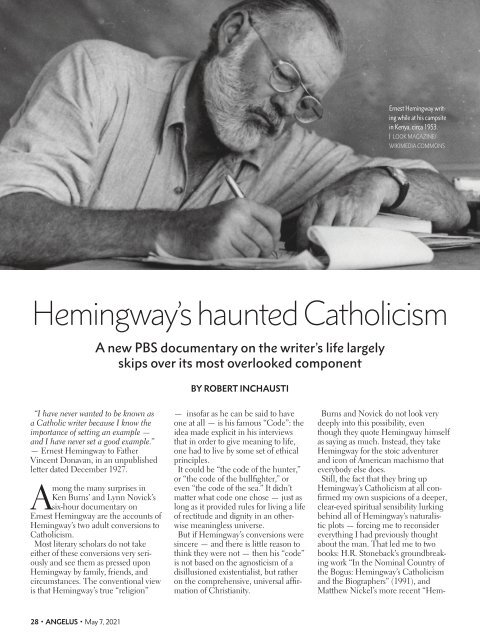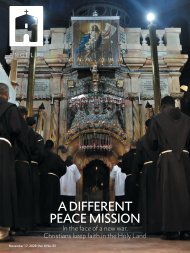Create successful ePaper yourself
Turn your PDF publications into a flip-book with our unique Google optimized e-Paper software.
Ernest Hemingway writing<br />
while at his campsite<br />
in Kenya, circa 1953.<br />
| LOOK MAGAZINE/<br />
WIKIMEDIA COMMONS<br />
Hemingway’s haunted Catholicism<br />
A new PBS documentary on the writer’s life largely<br />
skips over its most overlooked component<br />
BY ROBERT INCHAUSTI<br />
“I have never wanted to be known as<br />
a Catholic writer because I know the<br />
importance of setting an example —<br />
and I have never set a good example.”<br />
— Ernest Hemingway to Father<br />
Vincent Donavan, in an unpublished<br />
letter dated December 1927.<br />
Among the many surprises in<br />
Ken Burns’ and Lynn <strong>No</strong>vick’s<br />
six-hour documentary on<br />
Ernest Hemingway are the accounts of<br />
Hemingway’s two adult conversions to<br />
Catholicism.<br />
Most literary scholars do not take<br />
either of these conversions very seriously<br />
and see them as pressed upon<br />
Hemingway by family, friends, and<br />
circumstances. The conventional view<br />
is that Hemingway’s true “religion”<br />
— insofar as he can be said to have<br />
one at all — is his famous “Code”: the<br />
idea made explicit in his interviews<br />
that in order to give meaning to life,<br />
one had to live by some set of ethical<br />
principles.<br />
It could be “the code of the hunter,”<br />
or “the code of the bullfighter,” or<br />
even “the code of the sea.” It didn’t<br />
matter what code one chose — just as<br />
long as it provided rules for living a life<br />
of rectitude and dignity in an otherwise<br />
meaningless universe.<br />
But if Hemingway’s conversions were<br />
sincere — and there is little reason to<br />
think they were not — then his “code”<br />
is not based on the agnosticism of a<br />
disillusioned existentialist, but rather<br />
on the comprehensive, universal affirmation<br />
of Christianity.<br />
Burns and <strong>No</strong>vick do not look very<br />
deeply into this possibility, even<br />
though they quote Hemingway himself<br />
as saying as much. Instead, they take<br />
Hemingway for the stoic adventurer<br />
and icon of American machismo that<br />
everybody else does.<br />
Still, the fact that they bring up<br />
Hemingway’s Catholicism at all confirmed<br />
my own suspicions of a deeper,<br />
clear-eyed spiritual sensibility lurking<br />
behind all of Hemingway’s naturalistic<br />
plots — forcing me to reconsider<br />
everything I had previously thought<br />
about the man. That led me to two<br />
books: H.R. Stoneback’s groundbreaking<br />
work “In the <strong>No</strong>minal Country of<br />
the Bogus: Hemingway’s Catholicism<br />
and the Biographers” (1991), and<br />
Matthew Nickel’s more recent “Hem-<br />
28 • ANGELUS • <strong>May</strong> 7, <strong>2021</strong>


















